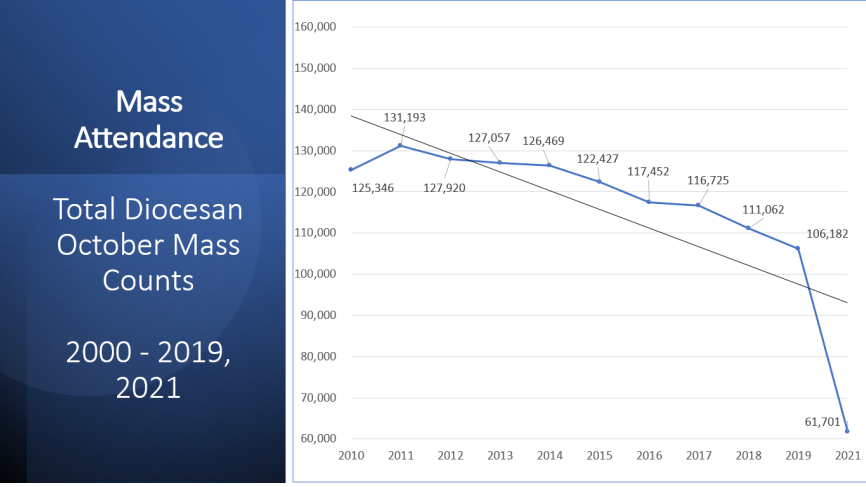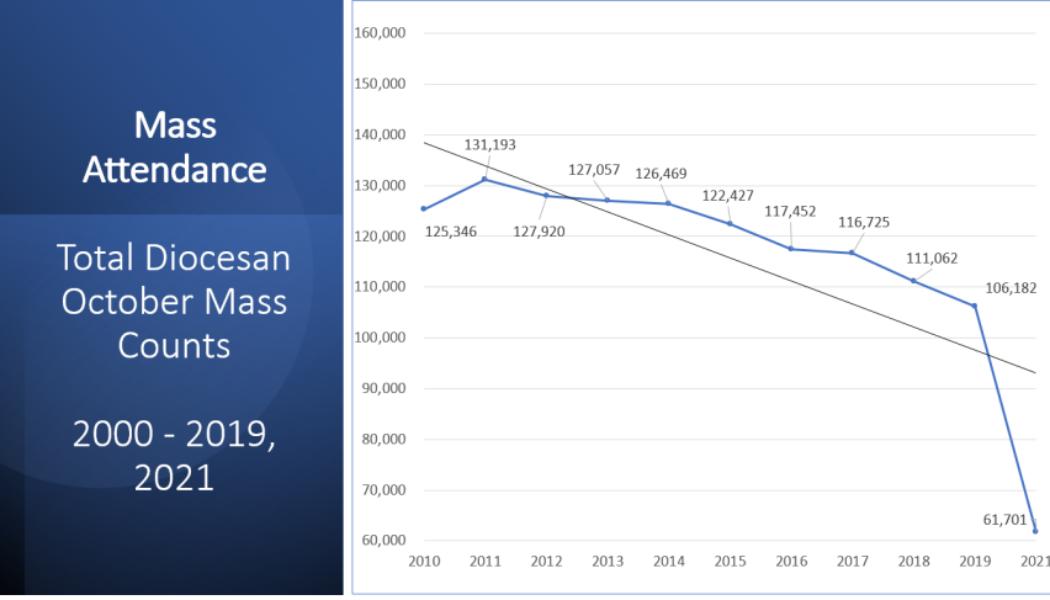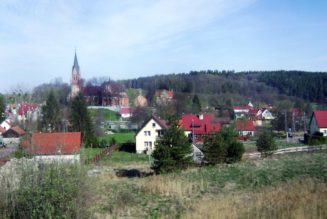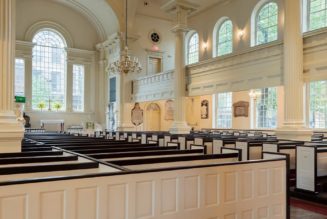A revealing publication recently released by the Diocese of Oakland, the Mission Alignment Project Interim Report, represented an effort to include priests and laity in the bishop’s inevitable decisions to cluster, merge, or close a number of its 81 parishes. The 73-page report is a fascinating read for its raw data and transparency.
The report defined “cluster” as follows:
Two or more parishes remain separate and retain their names but share one or
more priests and one administration.
Merger:
Two or more parishes are combined to form one new parish while consolidating
membership, property and finances.
Closure:
Church and other buildings sold, rented or used for other purposes. Parishioners attend a neighboring parish.
While the project began in January 2021, the middle of the pandemic, the meetings took place during the first half of 2022, long after the dispensation on attendance to Holy Mass had been cancelled. The diocese, however, never really recovered from the pandemic:

As a result of the combination of fewer vocations and retirements, the diocese is running out of priests:

There were three sets of meetings: one on a broader regional level, another on the local deanery level (several churches unified geographically), and one limited to clergy. Some of the top concerns that came out of the regional meetings:
- Too many parishes and Mass times.
- More Masses don’t mean better attendance
- 2/3 of parishes have yellow or red financial scores.
- Drop in number of 1st Communions/Confirmations as compared to Baptisms
- Demographics and location impact finances and attendance.
- More evangelization needed: youth, families and lapsed Catholics.
Unsurprisingly, the biggest concerns coming out of the meeting of Bishop Michael Barber and the clergy were attendance and financials:
- Large number of Masses vs. seating capacity and attendance.
- Some parishes rich in spirit and sacraments are financially struggling.
- Inner city/urban parishes in the red.
- Cultures and ethnicities have different models of giving.
Far more laity were in involved in the deanery-level meetings and common themes emerged. One is that churches which are financially stable should help support those that are not:
Adjust diocesan assessment for social equity (i.e., red parishes do not pay an assessment, yellow
parishes pay an adjusted assessment, and green parishes have a more progressive assessment
to pay).Redistributing resources: human, students, financial, clergy, administration and formation
and sacramental programs would be beneficial to deanery and parishes.Consider combining the financially weak with the stronger parishes.
Diocesan assessments should only be taken from financially ranked green parishes.
Another common concern was that there were too many Masses:
Reduce Mass times to fill the churches to have a vibrant “Sunday experience.”
Too many Masses for the numbers attending.
Reduce Mass times in clusters.
Finally, in the deanery-level meetings there was a definite preference for clustering weaker parishes with stronger ones rather than closure or merger.
Cluster better than merger because it maintains each parish’s identity and strengths and allows
for parishioners to have more say in parish life.Of the six table groups, the common thread was clusters were better than mergers. It was important to
these parishes to keep their identities.Clustering would keep the identity and charism of each parish, protect legacy
sacraments, create cost savings by having one administration and one priest.The groups shared strong negative feelings about closures and were also not open to mergers
either. The biggest reason was because each parish believes in the importance of their own
identity, and they would like to maintain this.
The problem with clustering is that there are not enough priests to go around. Had I been invited to one of the meetings I would have advocated for closures, reminding them that in the early 1980s the Archdiocese of San Francisco closed about a dozen parishes, and then had to reopen most of them a decade later.
Also, in the report there was a comparison of the 5-year average attendance to that of 2021 for each parish. The average decline in attendance was 47%, a reduction of almost half. There were only two churches that bucked that trend. One was St. David of Wales in Richmond and the other St. Margaret Mary in Oakland. The former is a small parish with a school that actually increased its attendance, the latter is a traditional community with daily Masses in Latin led by a Canon from the Institute of Christ the King Sovereign Priest, where attendance declined by only 5%.
St. Margaret Mary Church, Oakland, CA
” data-medium-file=”https://thefivebeasts.files.wordpress.com/2022/09/st.-margaret-mary1.jpg?w=300″ data-large-file=”https://thefivebeasts.files.wordpress.com/2022/09/st.-margaret-mary1.jpg?w=863″ class=”alignnone wp-image-9396″ src=”https://thefivebeasts.files.wordpress.com/2022/09/st.-margaret-mary1.jpg” alt=”st. margaret mary1″ width=”266″ height=”177″ srcset=”https://thefivebeasts.files.wordpress.com/2022/09/st.-margaret-mary1.jpg?w=266&h=177 266w, https://thefivebeasts.files.wordpress.com/2022/09/st.-margaret-mary1.jpg?w=532&h=354 532w, https://thefivebeasts.files.wordpress.com/2022/09/st.-margaret-mary1.jpg?w=150&h=100 150w, https://thefivebeasts.files.wordpress.com/2022/09/st.-margaret-mary1.jpg?w=300&h=200 300w” sizes=”(max-width: 266px) 100vw, 266px”>
The experience of St. Margaret Mary suggests to some extent this might be a spiritual crisis that needs a spiritual response.
…rjt
Join Our Telegram Group : Salvation & Prosperity








